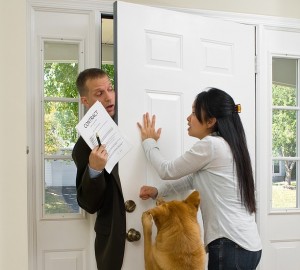 Question: Years ago I read that in Oklahoma, if a debt claim is disputed, a third party may not engage in collection activity. Recently I have searched the internet, and cannot find any reference to this concept.
Question: Years ago I read that in Oklahoma, if a debt claim is disputed, a third party may not engage in collection activity. Recently I have searched the internet, and cannot find any reference to this concept.
Recently, I have received notice that a former landlord is claiming that I owe them $813 for a lot of nonsensical claims.
That includes owing them a month’s rent, totally untrue, owing them for carpet cleaning, though they routinely have all carpets cleaned whenever a tenant moves out, and even “prorate paint,” which apparently means that if paint is supposed to last 10 years, I owe them for 3 years of that.
They included $100 for maid service, though a housecleaner can be obtained for half of that, plus “trash removal,” which would be the same thing as maid service. All trash removed could be carried in one hand. They reported “roaches,” though roaches come from inside the walls and other apartments, and I had always cooperated with extermination.
They reported a broken window and two missing light globes. These things were not the case when I left, though they waited weeks before cleaning the apartment. They have one maintenance man to do the work of three, and maintenance involves extreme delay time.
They report an August 10 move out date, though I moved out on July 31, a Sunday. They may have waited ten days before looking in the apartment, but I had given them notice 30 days before move-out. In fact, if I’m not there, I’m gone, and they could see that all of my belongings were gone, if they had simply looked.
Because the landlord is referred to as the “original creditor,” I suspect they may have sold thedebt. However, if this is so, the collection agency has employed an attorney, whose office is engaging in ordinary collection activity, making them a third party.
I am wondering what recourse I have; including the possibility that a third party might not be able to participate in collection activity.
Answer: I am not an attorney and cannot advise you on debt collection laws in Oklahoma. I suggest you seek advice from an attorney, in Oklahoma, regarding landlord tenant laws as well as Oklahoma’s laws governing debt collection.
The only suggestion I can make is to request debt validation from the attorney. That should get the ball rolling on what proof they have showing you owe the debt.
As far the “third-party” issue, again, I am not familiar with Oklahoma debt collection laws; however, a debt collector can hire an attorney to collect a debt. In turn, that attorney is subject to the same laws which govern debt collectors, namely, the Fair Debt Collection Practices Act. The below section of the FDCPA covers attorneys for debt collectors:
§ 805. Communication in connection with debt collection 15 USC 1692c
(b) COMMUNICATION WITH THIRD PARTIES. Except as provided in section 804, without the prior consent of the consumer given directly to the debt collector, or the express permission of a court of competent jurisdiction, or as reasonably necessary to effectuate a post judgment judicial remedy, a debt collector may not communicate, in connection with the collection of any debt, with any person other than a consumer, his attorney, a consumer reporting agency if otherwise permitted by law, the creditor, the attorney of the creditor, or the attorney of the debt collector.
The debt collector has not violated the FDCPA by communicating with their attorney. Good luck to you.















